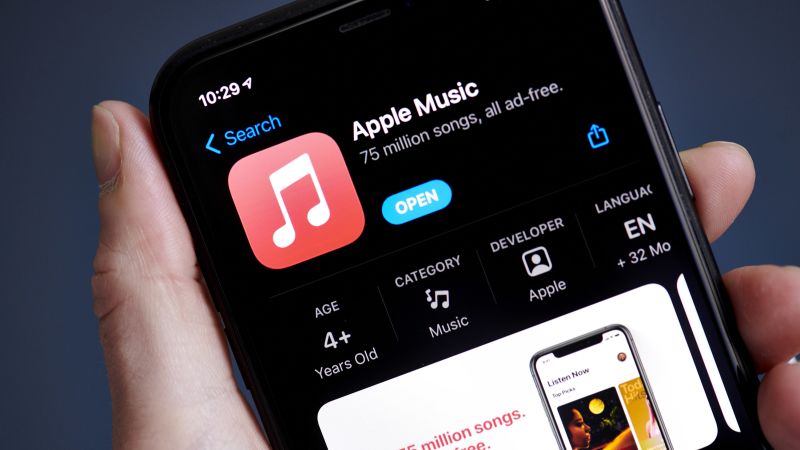Gabby Jones/Bloomberg/Getty Images
The EU is imposing its first-ever antitrust penalty on Apple for “abusing its dominant position” as a distributor of music streaming apps.
London
CNN
—
The European Union has fined Apple €1.84 billion ($2 billion) for breaking its competition laws.
The bloc announced Monday that it was imposing the fine on Apple (AAPL) — its first-ever antitrust penalty on the US tech giant — for preventing rival music streaming services such as Spotify from telling iPhone users that they could find cheaper ways to subscribe outside of Apple’s app store.
Margrethe Vestager, the EU’s competition and digital chief, said Apple had “abused its dominant position” as a distributor of music streaming apps, adding that, as a result, European consumers did not have “a free choice as to where, how and at what prices to buy music streaming subscriptions.”
“This is illegal and it has impacted millions of European consumers,” Vestager said at a press conference.
Apple currently bans app developers from fully informing the users of iOS — the operating system for iPhones and iPads — about cheaper music subscriptions available outside of the app, the European Commission, the EU’s executive arm, said in a statement. For example, developers are not allowed to inform iOS users about the price differences between in-app subscriptions and those available for the same streaming service on a website.
Apple responded that the European Commission’s decision had been reached despite “its failure to uncover any credible evidence of consumer harm, and ignores the realities of a market that is thriving, competitive, and growing fast.”
The company said in a statement that app developers “compete on a level playing field” on Apple’s app store. It plans to appeal the fine.
The European Commission said it had added a lump sum of €1.8 billion ($1.95 billion) to a basic fine in an attempt to deter Apple, as well as other big tech companies, from violating its antitrust laws.
“If you are a company who’s dominant and you do something illegal, it will be punished,” said Vestager, adding that, by itself, the basic fine was equivalent to a “parking ticket” for Apple.
The total €1.84 billion fine amounts to 0.5% of Apple’s worldwide annual turnover, according to Vestager.
The European Commission opened a formal antitrust investigation into Apple in 2020 after Spotify (SPOT) lodged a complaint against Apple the previous year, accusing it of unfairly disadvantaging its competitors.
It said Apple required the Swedish music streamer and other content providers to pay a 30% fee on purchases made through Apple’s in-app payment system, while its own service, Apple Music, didn’t have to pay the fee. Spotify also said Apple prevented it from sharing information about subscription deals with customers who use iPhones.
Apple is “one of the biggest sellers of the smartphone” and its smartphone operating system “is the only way to offer our app to anyone with an iPhone,” according to Spotify.
The streamer said the EU’s decision to fine Apple sent “a powerful message.” “No company, not even a monopoly like Apple, can wield power abusively to control how other companies interact with their customers,” the music streamer said in a statement.
In its statement, Apple argued that Spotify was the “biggest beneficiary” of the EU’s fine. “Spotify has the largest music streaming app in the world, and has met with the European Commission more than 65 times during this investigation,” it said.
Spotify did not immediately respond to a request for comment on that claim.
In January, Apple announced changes to its handling of apps in the EU, including plans to allow third-party app stores on iPhones and iPads for the first time in the company’s history and significant cuts to its app store fees.
The changes were unveiled in anticipation of new EU rules taking effect this month as part of the Digital Markets Act, a sweeping set of competition regulations for Big Tech.
Brian Fung contributed to this article.

